BBC News, Mogadishu
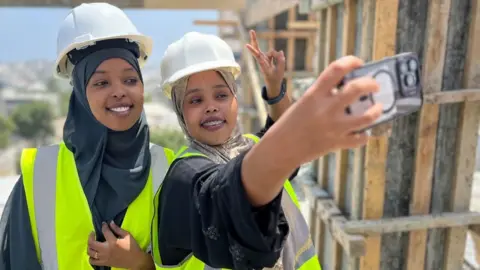 Anthony Irungu / BBC
Anthony Irungu / BBCConstruction is booming in Somalia’s capital city and as Mogadishu literally rises from the ashes of its violent past it is also giving unexpected opportunities to women like Fathi Mohamed Abdi and Saadia Ahmed Omar.
The two young female engineers have been overseeing the construction of a 10-floor apartment complex in Taleh in the city’s Hodan District.
Wearing hard hats they navigate their way through construction material, issuing instructions to a team of workers – all of whom are men.
“When I started, people doubted me,” 24-year-old Ms Abdi, the chief operating officer of Arkan Engineering Services, a Somali-owned construction company, tells the BBC.
“They would ask, ‘How can we trust a house built by a woman? How can I trust my money and property with a young female engineer?'”
She and her colleague Ms Omar have been practising engineers for the last five years.
“Mogadishu needs us,” says Ms Omar, who is also 24. “When I was young, this city was in chaos. Now, we are part of its reconstruction.”
Somalia, a former Italian colony, has experienced a prolonged period of civil war after the government of President Siad Barre collapsed in January 1991.
Even now, scars of decades of war are still visible – like in the central district of Shangani where there are bombed-out buildings. But the ruins are becoming hidden or replaced by tall office complexes and apartments, and a skyline dotted with cranes and scaffolding.
Both young women were born during the civil war and grew up witnessing their country fragmenting. While many Somalis chose to leave, they stayed, driven by a passion to rebuild, despite the fact that an insurgency was being waged by al-Shabab, a group linked to al-Qaeda.
“I think part of the reason women are getting more chances in this field is because there’s so much work to do, and not enough professionals to do it. That creates space for us,” Ms Omar says.
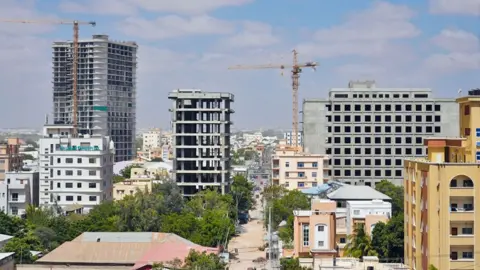 Mohamud Abdisamad / BBC
Mohamud Abdisamad / BBCIbrahim Abdi Heyle, chairman of the Somali Engineers Association, agrees the high demand for skilled professionals is leading to change – even if slowly in Somalia’s traditionally male-dominated society.
“With numerous ongoing infrastructure, energy, and technology projects, the workload has significantly increased. As a result, the association actively encourages greater participation from women, emphasising that they are not only welcomed but also vital in filling critical gaps in the workforce,” the 34-year-old says.
“The association believes that empowering women in engineering not only helps meet the growing demand but also brings diverse perspectives and innovative solutions to the industry.”
According to the office of the mayor of Mogadishu, over the last five years, more than 6,000 buildings have been constructed, marking a significant change in the city’s landscape.
“Security in Mogadishu has improved, leading to an increase in high-rise and commercial buildings,” says Salah Hassan Omar, the mayor’s spokesperson.
Nonetheless it has not been an easy path for Ms Abdi and Ms Omar as only 5% of engineers are women – and they often find opportunities for mentorship are scarce.
“When I applied for internships, most companies rejected me,” Ms Omar recalls. “They didn’t think a woman could handle the physical demands of engineering. I searched for three months before someone finally gave me a chance.”
Today, the two are among the most recognised female engineers in Mogadishu, having overseen more than 30 multimillion-dollar projects.
“The city is now home to taller buildings and modern infrastructure, a stark contrast to the Mogadishu of the past,” Ms Abdi says proudly.
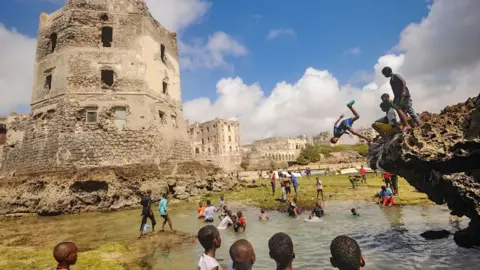 AFP / Getting Images
AFP / Getting ImagesBut not everyone is pleased with the transformation. Veteran architect Siidow Cabdulle Boolaay laments the loss of the city’s historical character.
“The buildings that once graced Somalia before the war were not only beautiful but also attracted attention due to their Italian-style architecture, which was rare in Africa at that time,” he tells the BBC. “The urban planning of Mogadishu was highly structured.”
Mr Boolaay also has safety concerns: “The sand used in Mogadishu’s buildings is salty, which undermines its effectiveness.”
Sand from Somalia’s long coastline is often used to make cement – a practice that is generally discouraged and, in many circumstances, restricted by international building standards because the high salt content can cause the corrosion of steel.
“These tall buildings are not designed to withstand fire or heavy rain, and safety for the tenants is not considered during development. Many of these buildings lack fire extinguishers and proper electrical installations,” he adds – visibly disappointed.
He is wary of the pace at which buildings are being constructed, which he says is compromising quality control.
For years, there were no regulations, leading to concerns about their structural integrity.
Mr Omar, from the mayor’s office, admits this was the case until three years ago – and says nothing can be done about those buildings.
But he insists there is now “quality control and nobody will build a building without it”.
“We are [also] preparing new laws that will clearly define where high-rise buildings can be constructed and where only residential houses should be built.”
Yet there are worries that while regulations are in place – there are often no follow-up checks because of the speed of the building boom.
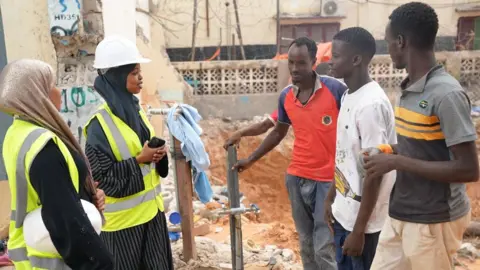 Mohamud Abdisamad / BBC
Mohamud Abdisamad / BBCMs Abdi and Ms Omar, who graduated from Plasma University Mogadishu’s faculty of civil engineering, say under their firm all their projects have been approved by the local authorities.
The rapid growth of construction projects has been attributed to diaspora investments as well as improved security – although Islamist militants who control large swathes of southern Somalia still target the city.
According to the World Bank, remittances made up 16.7% of the country’s gross domestic product (GDP) in 2022 – something that has given opportunities to architects and engineers.
But the rapid urbanisation has also exposed Mogadishu to infrastructure challenges – it lacks a proper sewage system and unregulated borehole drilling risks depleting groundwater reserves.
Christophe Hodder, a UN climate security and environmental adviser, warns that the unchecked construction boom could lead to long-term environmental consequences.
“We need a co-ordinated approach to water management, or we risk a crisis in the future. Each new building is digging its own borehole… in a small space, there could be 10 or 20 boreholes,” he told the BBC.
The government, in partnership with international organisations, is working on a new sewage system, but its implementation may require demolishing existing buildings – a controversial move that could displace residents and businesses.
Mr Hodder adds that there is a high population density in Mogadishu – people driven into the city by drought and conflict.
An increase in the urban population, especially in slum areas, might further increase poverty and social disparities, he says.
Despite these challenges, Mogadishu’s future looks promising. The city is striving to implement urban development regulations, improve infrastructure and ensure sustainable growth.
Even the bombings by the Islamist armed group al-Shabab – whose fighters tend to target plush hotels often occupied by politicians – does not dent the enthusiasm of the Somali Engineers Association.
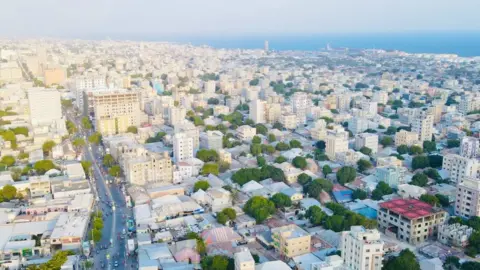 Mohamud Abdisamad / BBC
Mohamud Abdisamad / BBCMr Heyle admits it can be upsetting for architects and engineers whose buildings are destroyed but notes that Somalis have become resilient – especially those studying engineering.
“A lot of explosions happened; our dreams did not stop on that. Today we are reviving the engineering profession, which collapsed 30 years ago. That means there is hope.”
And the ambition is that in five years, Mogadishu will not only be a modern city but also a model post-conflict reconstruction.
“I believe Mogadishu is a different city compared to the 1990s; the city has changed to a new style, and Mogadishu’s development is in line with the new world,” says Ms Omar.
“When I walk through the streets and see buildings I helped construct, I feel proud. We are not just building structures; we are building hope.”
Ms Abdi agrees, adding: “We are proving that women can not only design buildings but also lead projects and shape the city.”
You may also be interested in:
 Getty Images/BBC
Getty Images/BBC


